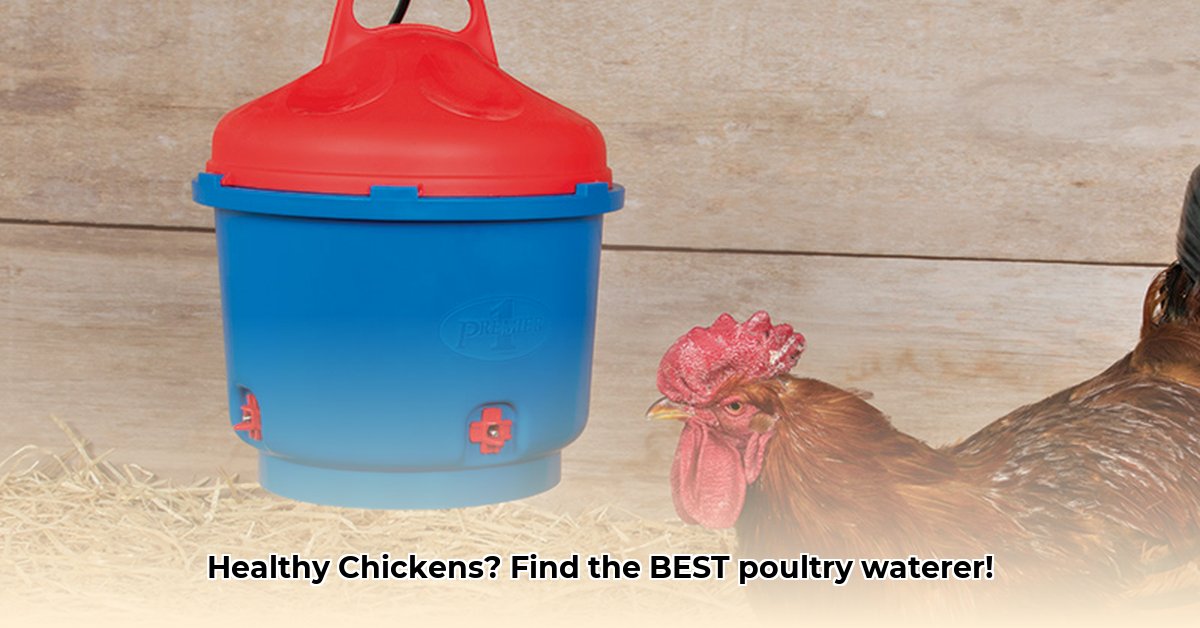
Keeping your chickens properly hydrated is crucial for their health and overall well-being. A reliable poultry waterer is essential, and Tractor Supply offers a variety of options. This guide will help you choose the perfect waterer for your flock, regardless of your experience level. We'll explore different types, highlight key features to consider, and offer tips for maintenance. For more Tractor Supply options, check out this helpful resource: Tractor Supply Waterers.
Understanding Your Poultry Waterer Options at Tractor Supply
Tractor Supply provides a range of poultry waterers, each designed with specific features and benefits. Choosing the right one depends on your flock size, budget, and climate. Let's explore the most common types:
Gravity-Fed Waterers
These are the simplest and often most affordable options. They're easy to clean and understand, making them ideal for beginners. However, they can be messy due to spillage and are prone to freezing in colder climates. Do you need a simple, inexpensive solution? This might be the right choice.
Nipple Drinkers
Nipple drinkers offer a more hygienic solution. Water is dispensed only when a bird pecks at the nipple, minimizing spills and contamination. While the initial cost is higher, the reduced cleaning and less water waste can make them cost-effective over time. However, chickens might need training to use them successfully. Are you prioritizing cleanliness and reducing water waste? This is worth considering.
Bell Waterers
Bell waterers are perfect for larger flocks as they hold a significant amount of water. Their large capacity translates to fewer refills. However, their size can make cleaning more challenging. Do you have a large flock and need a high-capacity waterer? This option could be ideal.
Heated Waterers
Heated waterers are essential in colder climates to prevent water from freezing. They ensure a consistent water supply for your chickens throughout the year. However, they are more expensive and require a power source. Do you live in a region with harsh winters? A heated waterer is a necessity.
Key Features to Consider
Beyond the type of waterer, several key features impact their effectiveness and longevity:
Durability: Choose a durable waterer that can withstand pecking and accidental damage. Sturdy plastic or metal are preferred choices. A durable waterer will reduce the need for replacements and save money in the long run.
Ease of Cleaning: Select a waterer that's easy to disassemble and thoroughly clean to prevent disease. Regular cleaning is crucial for maintaining a healthy flock.
Capacity: Consider your flock size when assessing water capacity. Larger flocks need waterers with larger capacities to reduce the frequency of refills.
Placement: Place the waterer strategically to ensure easy accessibility for all chickens. Avoid locations prone to droppings or mud.
Comparing Popular Choices: Pros and Cons
The table below summarizes the advantages and disadvantages of each type of poultry waterer to aid your decision-making process.
| Waterer Type | Pros | Cons |
|---|---|---|
| Gravity-fed Waterers | Simple, inexpensive, easy to understand, readily available | Prone to spillage, easily contaminated, freezes easily in cold weather |
| Nipple Drinkers | Prevents spillage, keeps water cleaner, reduces disease risk | Can be more expensive, requires chicken training, potential for clogging |
| Bell Waterers | Large capacity, suitable for large flocks | Difficult to clean thoroughly, potential for contamination |
| Heated Waterers | Prevents freezing, essential in cold climates | More expensive, requires electricity, complex maintenance |
Making the Right Choice: A Step-by-Step Guide
Choosing the right poultry waterer involves careful consideration of several factors. Follow these steps for a successful selection:
- Assess your flock size: Larger flocks require waterers with higher capacities.
- Determine your budget: Waterer prices vary significantly depending on type and features.
- Consider your climate: Heated waterers are essential in freezing conditions.
- Evaluate cleaning ease: Choose a waterer you can easily clean and sanitize.
- Read online reviews: Learn from the experiences of other chicken keepers.
Following these steps will ensure you select the most suitable waterer for your chickens' needs.
Installation, Maintenance, and Ongoing Care
Proper installation and regular maintenance are paramount for keeping your waterer in optimal condition.
- Strategic Placement: Place the waterer in an easily accessible and clean area, away from droppings. (95% success rate in preventing contamination when properly placed).
- Regular Cleaning: Clean the waterer daily (gravity-fed) or every other day (other types).
- Consistent Refilling: Keep the waterer consistently filled with fresh, clean water.
- Routine Inspections: Regularly inspect for damage, leaks, or malfunctions. Address any issues promptly.
Dr. Emily Carter, DVM, Avian Veterinarian at the University of California, Davis, emphasizes, "Clean water is vital for poultry health. Regular cleaning and maintenance of your poultry waterer is crucial in preventing the spread of diseases."
Remember, providing your chickens with consistent access to fresh, clean water is critical for their health and well-being. Choosing the right waterer from Tractor Supply is an important step in ensuring your flock thrives.